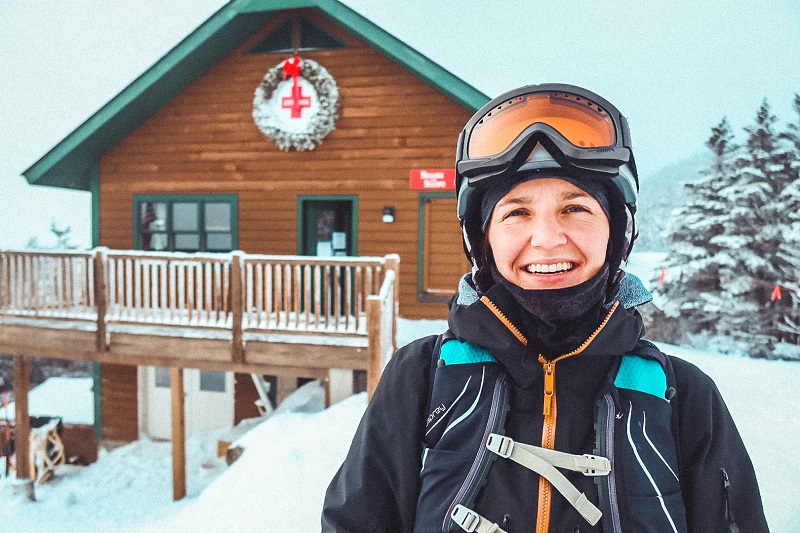
After spending a few years in the agriculture and coffee industries, where she cultivated a passion for sustainability, Sylwia Padiasek wanted to learn data analytics skills in order to apply a data-driven approach to supply chains. Less than two weeks after completing the Data Analytics Career Track at Springboard, Padiasek landed a job with Gro Intelligence, a New York-based AI and data company that illuminates the relationships between our earth’s ecology and the human economy.
While she was intent on a career change, Padiasek says she wanted to pivot into a role where her background would serve as an asset, rather than starting from scratch in an entirely new field. As an analyst, Padiasek says she sees a lot of data that suggests that climate change is moving at a far more accelerated pace than most people realize.
I joined Gro Intelligence as a senior research analyst about a month after graduating from Springboard. I feel like I landed a position that exactly matches what I learned during my master's program in sustainability and also my previous experiences in the coffee industry, plus my Springboard experience, where I studied data analysis. All these things made me ready for the position at Gro Intelligence. It's really the perfect match for me. I love it here and it's a great company to work for.
Before Springboard, I was working for a coffee roaster as a green coffee buyer. Coming from a food and beverage background, I felt like agriculture as an industry is very ancient and lacks a lot of decision-making that's based on data. When COVID hit and all the companies were in quite a lot of trouble, I decided it was time for a change. My first thought was to become a photographer. I started a website and I was kind of ready to go. And then I realized it made no sense in this current climate. Even seasoned photographers were having problems.
"I wanted to pivot into something that would add to my current skills rather than doing a complete career switch."
Data science was my first thought, but I know that becoming an excellent data scientist takes more than a half-a-year boot camp. I decided data analytics was better suited based on my past experience and what I want to do in the future.

When you're struggling, you definitely keep your mind open. So I certainly had thought about other industries as well, but I think my ideal goal was to stay in the coffee industry. It was my focus when looking for the next opportunity. So agriculture, climate, and sustainability were a natural choice for my next steps. I was just lucky that I happened to find a role that combines these interests.
Having access to so much data and not only reading the headlines but also writing them. It just is really sad that the world is changing the way it is. The heat waves that have been happening this year really had an impact on agriculture, and [the data] shows the climate is changing. I knew climate change was happening, but until now I couldn't touch it or feel it and now I definitely see it.
Yes.
Data analytics seemed like a good complement to who I already was, what I already knew, and the skills I already had. Even if I hadn’t lost my job during the pandemic, I probably would have pursued it. I think it can be a really great addition to anyone’s portfolio of skills, as long as they’re passionate about it and know what they’re going to use it for.

Yes, I think it can open many doors. There are just so many opportunities within different industries where having strong data analytics skills can help you analyze data, find a story within the data, and write about those insights—especially if you’re passionate about something. Whether it's working with Excel, Python, storytelling—whatever skill you learn in the Springboard course you can translate to any industry because every industry has data.
Definitely two things. One was the mentorship program and career coaching. I thought it was comforting to have that person whom you meet with [virtually] every week. That helps keep you accountable. Also knowing that during the course and even after graduation, you will have career coaches on hand who can prepare you for interviews. Secondly, the price was reasonable. When you’re trying to pivot in your life or career, and you're not sure if this [new path] is right for you, the price matters because you're investing your time and money.
My Springboard experience was great. I tackled the program within about four months, even though I took a couple of breaks to travel. I was initially assigned a mentor, but then during my first capstone project, I presented a time series analysis of the coffee industry to Chris, one of the mentors, and we really hit it off. After that, he started helping me a lot, and at some point, he just became my mentor. It was great. It almost felt like I was recruiting the mentors and the career coaches who best fit my needs instead of the other way around. Some people like to go with the flow and work with whatever is given to them, but I really tried to work with the people who understood my mindset and what I thought I needed the most, and it turned out great.
I think a lot of mentors at Springboard are kind of like your friends. Chris has really become my friend and we've talked many times since the course, just to check-in and see how things are going. We always talk about meeting for coffee in New York [where I’m based], even though he's in Australia right now and under lockdown. Not only is the mentorship unique, but also the community and how much people helped one another. Even after graduating, I’ve tried to help other students and give them advice. There were times when I felt lost during the course, but you have to struggle a little bit to come out on the brighter side. Overall it was a great experience and exactly what I needed at the time.
I was. Many people were struggling and I was struggling as well, so it was easy to relate to them and help them see the brighter side. In the end, it's just a course, but there is so much pressure around [making] a career change and the fact that you're not necessarily working but devoting all your time to this course. So it's a lot of pressure for a person who is not living with their parents.
I did a time series analysis on the price of coffee in Tableau. The goal was to find the relationship between the price of coffee and the Brazilian reais—which is the Brazilian currency—seeing as Brazil is the most important coffee grower in the region.
It was short and sweet. Basically, while I was working on my last capstone, I started pretty actively searching for a job. I talked to about four or five career coaches and in the end, I found one that I really liked. There was essentially no time between the official end of the course and when I received a job offer. A month after finishing the course, I started my new job.
Thank you.
Springboard has a unique curriculum but I think the most unique part of it is the career coaches, mentorship, mentors, the study groups—just access to people as a whole. Considering that the program was remote, I had access to so many actual human beings from all around the world who are always ready to help you. I don't think that you can really beat that. You can go on Coursera and find five different courses that will give you the same material, but you will not get the same support from professionals who are well respected in their respective industries.
My advice is to always follow your heart. I know it's cheesy, but follow the things that you're passionate about. Because if you do become a data analyst, you will spend a lot of time looking at data, reading different articles, and writing insights. You really need to be passionate about something in order to devote all your time to it. Let’s say you're in the music industry and you feel like there is no path for you—you probably can find a path as an analyst. I have the same love for the coffee industry and the agriculture industry, and I'm very happy that I can remain within these industries in some capacity.









